Dashnor Kaloçi
Memorie.al publishes some archival documents extracted from the Central State Archive in Tirana (fund of the former Central Committee of the ALP), where is the secret report of the former Prime Minister of Albania and the Secretary of the Central Committee of the ALP, Mehmet Shehu and his wife, Fiqreti, held in the XV Plenum of the Central Committee of the ALP, on October 26, 1965, with the topic: “The role of literature and arts in the communist education of the masses”, where were also invited some writers and artists. Who were the writers who were ‘crucified’ by Prime Minister Mehmet Shehu, who in his discussion made a detailed analysis in detail some of the creations in poetry of Fatos Arap, as well as the works and novels of some other writers that were considered “With ideological confusions”?!
In the early 1960s, after the breakdown of relations with the Soviet Union and a number of other countries in the socialist camp of Eastern Europe, a kind of confusion and apathy was noticed in the top communist leadership of Tirana and its leader, Enver Hoxha… Which consisted and had more to do with the new political course that official Tirana would follow, after those events that caused it a lot of shocks and problems.
After an extreme aggravation and tension of the class war, which had taken place in the years 1960 – ’61, which brought the condemnation of some “hostile groups”, where the most important was that of the Rear Admiral of the Fleet, Major General, Teme Sejko, or of those Albanian intellectuals who had studied in the countries of Eastern Europe or as they were then called the countries of the ‘People’s Democracies’, in the years 1962-’65, there was a ‘slowdown’ and mitigation of that war, which had taken place. in the context of maintaining power.
Thus, in those years, a kind of liberalization appeared in the socio-political life of the country, which consisted of: limiting arrests and convictions for political offenses, granting scholarships or study rights to the sons of “reactionaries”. And “inverted classes”, allowing the ‘yellow books ’of foreign literature, showing Western films in domestic cinemas, jazz music venues and orchestras with singers. etc.
But this kind of liberalization, or as it were, the “stunning” of the senior leadership of the ALP, personally of Enver Hoxha, did not last long. Thus, at the end of 1965, or the beginning of 1966, Enver began to “collect” what he had “released”, which continued until the beginning of 1971, with his “programmatic” speech (Revolutionization). further of the life of the country), held at the Plenum of the Party Committee of the district of Mat.
After that speech held in the spirit of the lessons of the “Great Cultural Revolution”, which was taking place in China, the class struggle in our country was strained again. Even tougher than before, (which began with the removal of ranks in the army in 1966, where they were sentenced to heavy imprisonment and some senior officers who opposed that decision) and the fight against religion that brought about the demolition of cult objects and the legal prohibition of religious beliefs.
After that, the object of Enver Hoxha’s attack, would become the intellectual elite of the country, led by writers and artists, where as a result: most of them were removed from Tirana and sent to live and work for years with queue in remote villages of the country. In this context of events, this was preceded by the XV Plenum of the Central Committee of the ALP, which was held 56 years ago, on October 25 and 26, 1965, under the leadership of Enver Hoxha.
From that plenum, where the main report on the topic: “Increasing the role of literature and arts in the communist education of the masses”, was held by the secretary of the Central Committee of the ALP, Ramiz Alia, we have selected for publication, the discussions of the former Prime Minister Mehmet Shehu and his wife, Fiqreti, who, at the time, was secretary of the Tirana Party Committee.
The plenum is opened by Enver Hoxha
In the archival document of that plenum, (AQSH F. 14. V. 1965, d. 2. p. 1) after the agenda with the topic we quoted above, it is written:
The Plenum was chaired by the first secretary of the Central Committee of the ALP, Comrade Enver Hoxha, assisted by all the candidates and members of the Central Committee, with the exception of comrades: Haki Toska, sick Nexhmije Hoxha, and Vito Kapo, Nesti Nase and Rrapi Germany abroad.
Collection Development
Comrade Enver Hoxha. Friends, in this meeting we are present 76 members and candidates of the Central Committee, five members and candidates are absent with reason, the majority is present and I declare the meeting open.
According to the agenda you have received, today we will review the report of the Politburo of the Central Committee on increasing the role of literature and arts for the communist education of the masses, which will be held by the member of the Politburo and the secretary of the Central Committee of the ALP, comrade Ramiz Alia and discussions.
Do we agree that the plenum should work on this agenda?
Who agrees to raise his hand (all comrades approve that the plenum to work on this agenda)?
As guests in this meeting participate the first secretaries of the KP of the districts that are not members of the plenum, the ministers and people of literature and art. Do you agree that these friends should participate in the plenum?
Who agrees to raise his hand? (All friends agreed)
Then, friends, we begin.
Discussion of comrade Mehmet Shehu
Comrade Mehmet Shehu: Comrades, the issue that was raised in the report of the Politburo and is being examined in this Plenum “On increasing the role of literature and arts in the communist education of the masses”, is of paramount importance, because literature and arts are considered by the party as a powerful ideological weapon in its hands to fight evil and spread good, to put “the last nail in the coffin of the bourgeoisie” and to create the new man, the new socialist and communist world.
No wonder Stalin called writers and artists “engineers of the human soul.” It is difficult to find another more perfect definition of the role of the people of literature and the arts in the communist education of the masses. It follows that, if we want to increase the role of literature and the arts in the communist education of the masses, writers and artists must become truly “engineers of the soul of the people.”
This means that they first purify their soul (conscience), then go deep into the feelings of the people who make up the environment, our society, study these (soul and feelings) well and we cannot say that no we are vulnerable to the influence of this ideological pressure. The writer or artist, especially today in our conditions, must be exceedingly clear in his expressions. He writes and creates for the people.
If people do not remember his poems or writings, or his painting, or his sculpture, or his music, these are not worth a penny. Today we are in the socialist regime, where the people are in power. The writer, who is the son of the people, does not have to cover his writing with fog, with incomprehensible phrases, with allegories that create doubts in the reader. The people must be spoken openly, clearly and with realistic artistic simplicity.
The power of the artistic word lies not in the camouflage and obscurity, in the difficulties of comprehension, but in the realistic artistic simplicity and in the straightforward effect it exerts on the spiritual senses of the reader. We need the popular style. But “the popular style – said Lenin – is far from vulgarism, from banalism …!
The ordinary writer does not presuppose a reader who does not think, who does not want or who does not know how to think … The vulgar writer presupposes a reader who does not think and who is not able to think …, serves the “ready” all the conclusions of a certain theory, so that the reader does not need to chew, but only to swallow this soup. Our writers should be not vulgar but simple.
And it does not seem to me that artistic creativity in the realms of literature should not remain almost the only monopoly of the writers of the Writers’ League. Why not open the door to the masses of employees to write poems, stories, novels and critiques? Nothing, nothing bad. There is no danger of descending into vulgarism, but greater opportunities will be created for the selection and affirmed writers who should play the role of inspirer and vanguard in this massive creative activity, will find inspiration in them, and culture will become of the masses on a larger scale.
A sick writer, in order to hide his opposition, puts on the mask of innovation, breaks and overturns every rule of artistic expression, presents his rounded eggs in the form of eggs, which can be remembered both this way and for good – even for the worse. This guy has opposed our reality and actuality but he does not dare to express his grief openly through the word artistic because he is afraid, but nevertheless finds “appropriate”, “artistic” forms, other “new” forms to express his suspicious mejtim.
Yes e.g. what Fatos Arapi says in his poems published by the State Publishing Company “Naim Frashëri”:
“I walk the newly opened streets / and whistle between the lips now / my songs that no one knows …”
i.e. he has entered “newly opened roads”, but no one knows his ways, as the people do. Why? Because they are foreign to the people. And below he concludes:
“The other happiness / the world needs! / And fairer / and more human …”
That is, according to him, there is no happiness in us because there is no justice, no human feelings. Or in a poem:
“I came to understand / That life is beautiful / Great as many times / In its greatness / We feel joy and fear”.
i.e. that he is afraid if he does not feel guilty? Or who is he afraid of? Fear of the enemies of the homeland? Then you are not a poet but a coward. Fear of the dictatorship of the proletariat? Then she feels guilty in front of her. This is a young poet who has also done some good poetry. But with these verses we quoted, and with many others like these, he presents his political views through various passages, good through his verses like the weed in the garden.
Here is what the author himself says in an unpublished poem:
“I cannot understand you all / You cannot understand me all / Yes … even a particle / from me in the catch / then you caught me completely. / I am hooked / through fragments / There are through world full of food / Walk on the barren land”.
Do we not have the right to argue that this poet does not fully agree with the worldview and reality of our lives? Of course, he can still be corrected and we should try to correct him, after all, the fact is that he has also written some good poems. Apparently, he has confusion in his brain. But how can he be healed only through wise advice and friendly criticism, if he has not decided to go further into the confusion of his political and ideological opposition.
Literary criticism needs to be expanded. Only with open criticism can people be corrected. And it seems to me that literary criticism should be done not only by some people who specialize as literary criticism. When a poem, a novel, or a piece of music is not politically or ideologically correct, this critique can be made not only by one who specializes as a literary or musical critic, but also by every man of art, even any ordinary citizen… The best proof to get the citizenship certificate for a work of art is public opinion, inspired by the teachings of the party.
It must be said that the criticism and self-criticism among our writers is not at the right height. The writer or artist must have the initiative and courage to say his own word. Without a war of opinions, art and culture cannot develop. And this fight should be done by the artists and writers themselves and not to expect everything from above, from the party. Of course, the party runs the arts and culture. But self-action in the literature and art sector takes on greater importance.
Discussion of his wife Fiqret Shehu
Comrade Fiqret Shehu: Friends, by making a comprehensive and in-depth analysis of the work so far in the literature and arts sector, and determining the orientation for the future, the report of the Politburo held in this Plenum by Comrade Ramiz Alia, opens before the writers and artists new horizons and will inspire them for a creativity with the highest ideological content and the most worthy artistic level, which will serve the further fair development of literature and arts in our country. .
The report also clearly sets out the tasks of the party organizations for a better leadership and use of literature and arts in the work for the ideo-aesthetic education of the masses. For this reason, this Plenum of K.Q. is of great importance to the whole party. But this plenum has a special value for the party organization of the city of Tirana, for a reason that the central artistic and cultural institutions and the vast majority of writers and artists are located in Tirana. Thus, out of 220 members and candidates of the League of Creative Writers and Artists in the whole country, 180 are in our city and in the 3 central artistic institutions there are 131 performing artists.
From this it becomes clear how important this plenum of K.Q. for our party organization as well as the responsibility that falls on us who work in the committee of the city of Tirana, as its secretaries and as members of the Plenum of the Central Committee, for the shortcomings and weaknesses that have been proven in the sectors of literature and arts, and for foreign performances in the creativity of some writers and artists, which were discussed in the report of the Politburo.
In these conditions, it becomes even more necessary to improve the ideological work to keep our intelligence of the arts and literature sectors clean and to avoid foreign appearances in literature and arts, no matter how small, in order to fight them in embryo, not to let them grow and then become a tendency, to become harmful to our society.
In the report of the Politburo, among others, a comprehensive analysis is made of some foreign performances that have been observed in literature and arts, showing their source as well as the ways to overcome them. Trying not to repeat, I want to emphasize that, under the pretext of innovation or the search for the “new” in art and to be “original”, under the pretext of the fight against “schematism”, “archaic”, conservatism and “stencilism” under the pretext of “expression of reality” – in the creativity of some writers working in the city of Tirana, foreign ideological attitudes and distortions of today’s reality and the national liberation war have been observed.
In this regard, in addition to Fatos Arapi’s drama “The Drama of an Unnamed Partisan”, which is mentioned in the report and which is really a very typical example, because it openly denies the heroism of the war, the reality of those years is distorted. glorious of the revolutionary war of our people, making all the characters scary, shaky, can improve the poem of the same author “we belong to communism”, in which he reinforces these views of his, raising the flag against positive hero and goes so far as to tarnish partisan heroism. With this poem the author argues, with contempt, with all our writers and poets who have raised high in their works the heroism of the partisans, about whom not enough has been written yet.
Under the pretext of presenting life as it is, in some cases, the reality of our days has been distorted, as has been done e.g. in Naum Priest’s drama “The White Siege”, the author of which, among other things, as presented in the work, does not even know the social relations that exist in our new society. Starting from this failed work, it is clear once again how important it is for writers and artists to know life, as a necessary condition to create a literary and artistic work with high ideological and ideological content. -artistic.
And it must be said that the knowledge of life is not a purely organizational problem, for the solution of which only a few measures should be taken, sending some writers or artists to the base, as some think. Knowledge of life by the writer and artist is primarily an important ideological problem, because to know and reflect life realistically in literary-artistic creativity, does not mean to live only physically on the basis or to go on an excursion to the enterprise o cooperative, but to try to know deeply the social relations between people, to know the worker in relations with friends and the car, to go deep into the mentality and psychology of the characters you will reflect, to see their attitude towards work, property, etc., you know the ideals they strive for and their aspirations.
Children’s literature developed greatly after the liberation. This is very positive. But it seems to me that it does not agree with our principles to educate children with fairy tales where heroes are kings, princesses or witches. Here, too, our writers could find subjects not only in the nature and life that surrounds us, but also in our rich and healthy folklore. Finally, it seems to me that more should be thought about the younger generation by publishing works that inspire acts of patriotism and heroism as well as expanding and fostering the knowledge of young people aged 12-18 by translating more works of scientific and technical vulgarization. I fully approve the report of the Politburo on literature and art held by Comrade Ramiz Alia and I commit that I will put all the forces to carry out the tasks assigned to us by the Party in this Plenum of the Central Committee.
After the Plenum, Shuteriqi, Kadare, Arapi, Siliqi, etc., were expelled from Tirana and sent to the districts for production!
After the XV Plenum of the Central Committee of the ALP, held on October 26, 1965, which under the leadership of Enver Hoxha gathered to discuss the topic “Increasing the role of literature and arts in the communist education of the masses”, for Albanian writers and artists, a real drama would begin. Only four months later, in February 1966, the Central Committee of the ALP issued the directive that: “Writers and artists must circulate on the basis and merge with the masses, because by living with the concerns of the people, they will know more closely the reality they will describe in their works”. All this was done in the spirit of the “Great Cultural Revolution of China”, which the senior leadership of the ALP tried to implement point by point in the conditions of our country. Following this directive of the Central Committee of the ALP, which was decided by the Political Bureau, the League of Writers and Artists was tasked to implement it. And as a result: in February-March 1966, writers, composers, painters, sculptors and artists from the most famous began to be called one by one into the League of Writers and Artists, giving them an idea of where they wanted to go. and where they could work. After that, the famous writer, Ismail Kadare, was sent to Berat, Dhimitër Shuteriqi to Rubik, Llazar Siliqi to Shkodër, Kol Jakova and Spiro Xhai to Laç i Kurbinit, Tonin Miloti to Rrëshen, Nasho Jorgaqi and Luan Qafëzezi to the military units of the district of Durrës, Naum Prifti in Divjaka, Gjergj Zheji in Kruja, Moisi Zaloshnja in Skrapar, Qamil Buxheli, Andrea Varfi, Petro Marko, Fatos Arapi and Kudret Velça in the villages of Vlora district, etc. Many of these writers and artists worked directly in production, while only a small portion of them settled as teachers in village schools or leaders in the Hearths of Culture. With this action, the senior leadership of the ALP and personally Enver Hoxha, put open pressure on the Albanian intelligence, letting them know that: ‘they too could end up in hell, where most Albanians lived …’! /Memorie.al




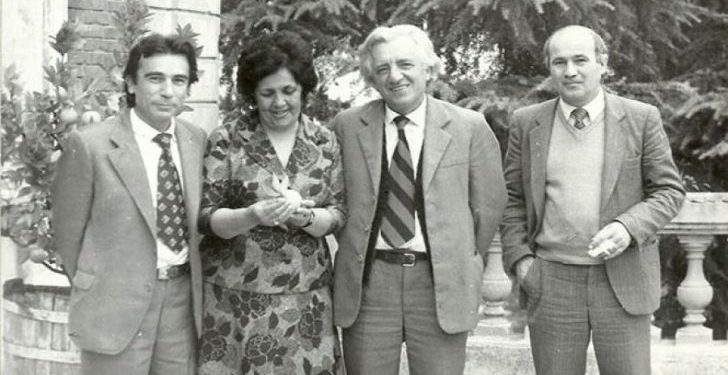
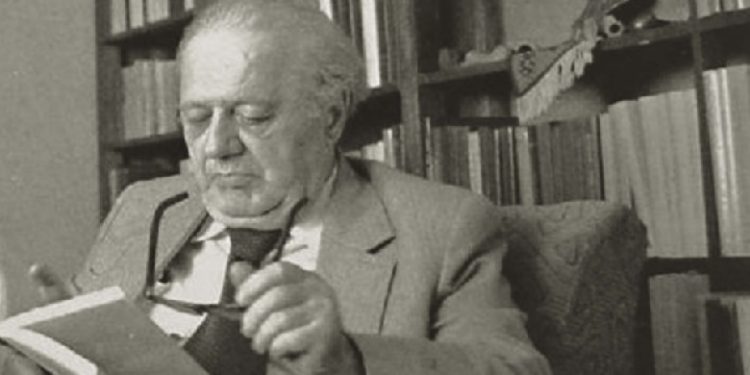
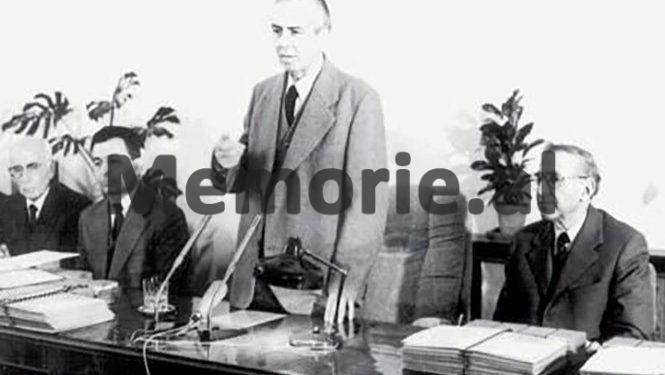
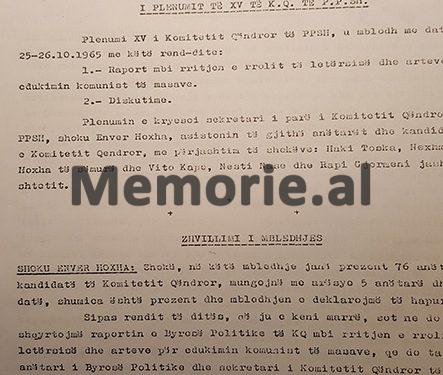
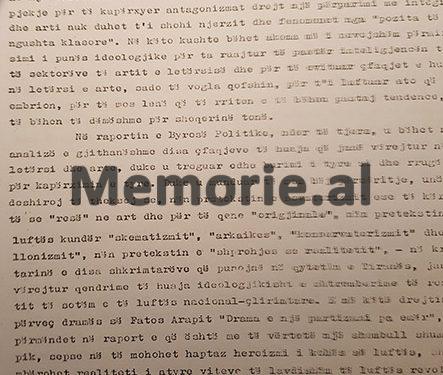
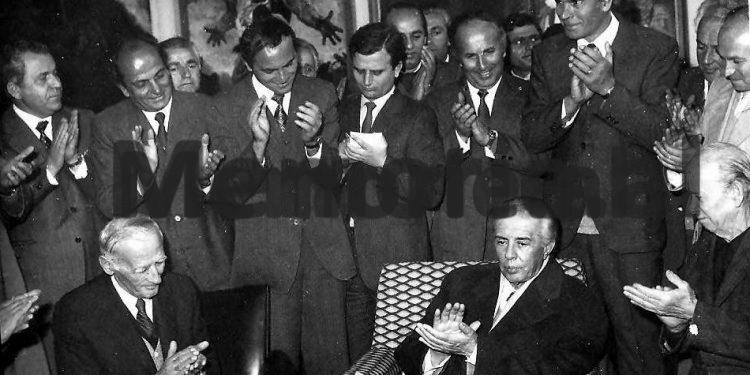
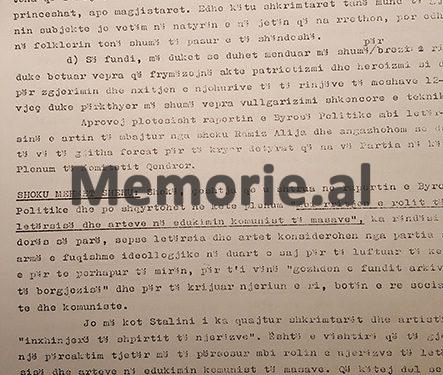
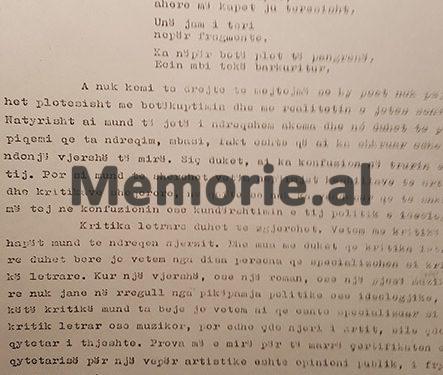

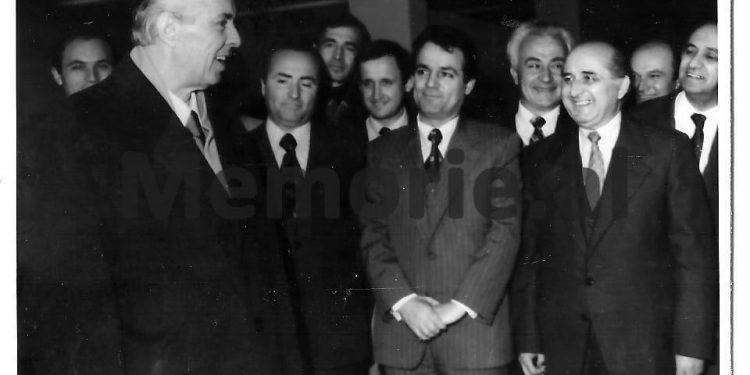
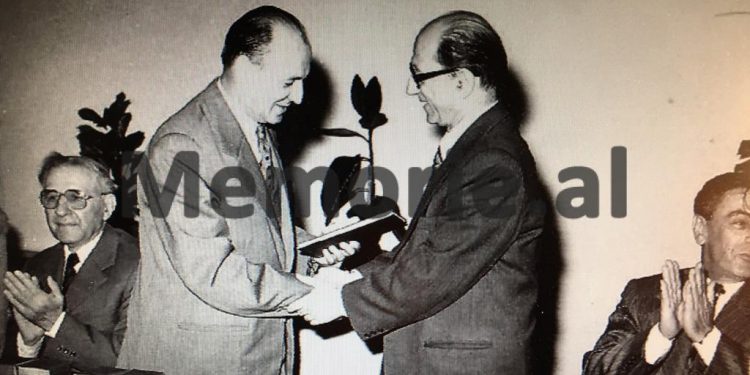



![“When the party secretary told me: ‘Why are you going to the city? Your comrades are harvesting wheat in the [voluntary] action, where the Party and Comrade Enver call them, while you wander about; they are fighting in Vietnam,’ I…”/ Reflections of the writer from Vlora.](https://memorie.al/wp-content/uploads/2025/06/admin-ajax-4-350x250.jpg)


![“The ensemble, led by saxophonist M. Murthi, violinist M. Tare, [with] S. Reka on accordion and piano, [and] saxophonist S. Selmani, were…”/ The unknown history of the “Dajti” orchestra during the communist regime.](https://memorie.al/wp-content/uploads/2026/02/admin-ajax-3-350x250.jpg)
![“In an attempt to rescue one another, 10 workers were poisoned, but besides the brigadier, [another] 6 also died…”/ The secret document of June 11, 1979, is revealed, regarding the deaths of 6 employees at the Metallurgy Plant.](https://memorie.al/wp-content/uploads/2026/02/maxresdefault-350x250.jpg)

